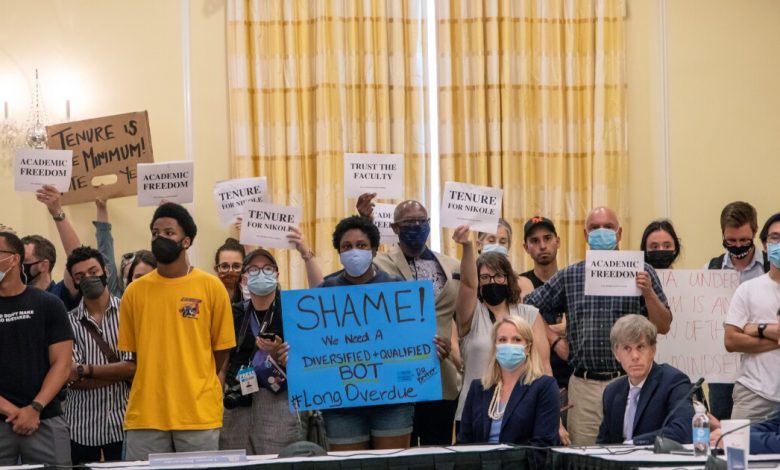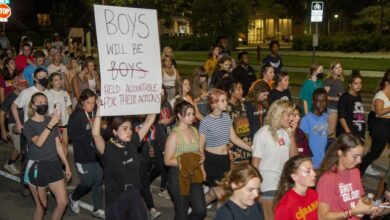U. of North Carolina Has Been Corrupted by Political Meddling, Faculty Group Says

[ad_1]
Nationwide, public higher education has often been a target of partisan meddling. But North Carolina’s university system is in a league of its own, according to a new report from the American Association of University Professors, released on Thursday.
The report, written by a special committee, details a laundry list of scandals that have plagued the University of North Carolina over the past decade or so. Some are eponymous: Nikole Hannah-Jones. The Confederate monument known as Silent Sam. Others are less known outside the state, such as the controversial selection of a former member of the system’s board as Fayetteville State University’s new chancellor.
After examining all of these scandals, the report posits that the UNC system has, in essence, been corrupted by partisan interference. Put succinctly by one Appalachian State University professor who was interviewed by the committee: “The fish rots from the head.”
There’s been “overreach by the Board of Governors and Boards of Trustees into specific campus operations,” and “outright disregard for principles of academic governance by campus and system leadership,” along with “institutional racism” and “a hostile climate for academic freedom across the system,” according to the report. Those issues exist elsewhere. Yet the “frequency and intensity” of the controversies, coupled with “constant mismanagement” by the system and campus boards, is “unique to UNC.”
One former trustee at the Chapel Hill flagship told the committee that the system’s Board of Governors has received marching orders from the Republican legislature “to fix the ‘crazies’ in Chapel Hill. … Does the legislature care about institutional damage? No, not at all.”
Kimberly van Noort, the system’s chief academic officer, strongly refuted the committee’s characterization. “You offer a relentlessly grim portrayal of one of the nation’s strongest, most vibrant, and most productive university systems,” van Noort wrote to the AAUP in March. (A system spokesperson provided van Noort’s response to The Chronicle.)
She noted that the system has over the past several years improved graduation rates among low-income and minority students and secured “substantial raises” for faculty and staff members in the most recent state budget, among other improvements.
“Your report,” van Noort wrote, “contains no empirical data about the true health of the university system.”
State lawmakers, meanwhile, have often touted their investments in the UNC system, including increased funding for campus infrastructure and an $82.5-million program that allows in-state students to pay just $500 in tuition at four of the state’s public universities.
Reining in Liberals
The recent arc of the University of North Carolina’s story, detailed in the AAUP report, is a familiar one to many academics: After 2010, when Republicans won majorities in both houses of the state legislature for the first time in more than 100 years, those lawmakers saw an opportunity to rein in “out-of-control liberalism” within the system, as the report puts it.
Their primary vehicles for doing so were university boards. North Carolina’s legislature elects the system board’s 24 voting members, who select the system president. Called the Board of Governors, this system board also approves chancellors for each campus, as well as eight of each campus’s 13 trustees.
The 36-page AAUP report describes much of the board drama that has drawn national attention to UNC in the past decade. There was 2015, when the Board of Governors shuttered three university-based centers, including the Center on Poverty, Work, and Opportunity, which was directed by an outspoken critic of the state’s Republican leadership. There was 2017, when the board prohibited the Center for Civil Rights, affiliated with UNC-Chapel Hill’s School of Law, from filing lawsuits on behalf of its primarily low-income clients.
And then there was 2021, when the system’s board decided not to reappoint another vocal professor to the University of North Carolina Press’s Board of Governors, despite his serving as its chair for the past six years and recommendations in his favor.
The board did not publicly explain why it did not reappoint Eric L. Muller, but NC Policy Watch reported that at least some members took issue with the professor’s public criticism of how the board had handled Silent Sam, among other things.
Though Muller told the committee there was “never any pressure about the publishing program” while he was on the press’s board, he worries that his removal was “about more than shutting up a loudmouth law professor.”
Governance problems extend beyond the system’s governing board, according to the report. At Appalachian State University, instead of conducting a national search for a new provost, the university’s chancellor appointed the interim to the post, over objection from the faculty, the report says.
Perhaps the “single best illustration of the autocratic forces at work at ASU,” the report says, “is that the university’s general counsel has begun to issue ‘cease-and-desist’ letters to faculty members who lodge criticisms against the administration.”
A spokesperson for Appalachian State sent The Chronicle responses that the university had provided to the AAUP before the report’s publication, some of which were included in the final report. Sheri Everts, the chancellor, was “well within her legal and policy rights” to install Heather Hulburt Norris as provost, the document says. It’s also “untrue” that Norris had “no faculty support.”
The general counsel’s office issued a cease-and-desist letter to a faculty member who “communicated threats” to Everts and Norris, calling them, among other things, “murderers” and writing that “judgment is coming” for them. “This faculty member’s communications went well beyond simply ‘critiquing’ administration, and even goes beyond being highly unprofessional.”
Meanwhile, at Fayetteville State, faculty members and students were enraged when Darrell T. Allison, a former member of the system’s Board of Governors, was selected as chancellor. Asked about the state of shared governance at Fayetteville State, one faculty member retorted to the AAUP committee, “Shared governance? What’s that?”
If anything, to avoid being repetitive, the report underplays how problematic professors think the current situation is across the UNC system, said Henry Reichman, a member of the AAUP special committee and a professor emeritus of history at California State University-East Bay. Overall, morale was depleted. Most people felt that the system is “desperately in need of strong leadership that it isn’t getting,” Reichman said.
A Malaise Among the Faculty
The picture painted by the special committee wasn’t entirely dark. On the issue of academic freedom, faculty leaders on several campuses said the value was not in jeopardy, at least locally. The Faculty Senate chair at East Carolina University said it was her “wholehearted belief” that professors had academic freedom for their research and advocacy. Said another senate chair: “You can have any freedom if you are willing to stand up.”
Still, the committee heard about a “deep-seated malaise” among the faculty, which has “potential implications for academic freedom.”
It’s clear from the report that, as some professors see it, both the Silent Sam and Nikole Hannah-Jones sagas left lasting bruises that haven’t healed. Faculty members from other campuses cited those two events in talking to the committee “as shaping their sense of belonging and security,” the report says.
Virtually all of the more than 50 people who spoke with the committee said they were concerned about the system’s ability to retain talented professors, particularly faculty members of color. UNC-system data indicate an upswing in employee turnover last summer, though system officials largely blame the pandemic, Inside Higher Ed reported.
“Everybody I know will leave here at the first opportunity,” one Black UNC Chapel Hill faculty member told the committee.
What was striking to Afshan Jafar, a professor of sociology at Connecticut College who co-chaired the special committee, was how issues of governance, political interference, academic freedom, and institutional racism overlap. “Unless the system administration and leadership understand this and address it comprehensively,” Jafar said in an email, “no task force on race or governance is going to be able to fix the problems at UNC.”
Jafar also noted how “relentless” the scandals have been. One faculty member who was interviewed by the committee referred to UNC as the “University of Never-Ending Crises.”
Van Noort, in her letter to the AAUP, acknowledged that North Carolina’s public universities “have challenges and shortcomings.” University leaders don’t hide from them, she wrote.
She pointed to the report’s assertions that the system “needs strong and independent leadership at all levels” — specifically, leaders who defend academic inquiry and “do more than simply pay lip service” to the notion of equity. “We could not agree more,” van Noort wrote, “and we think any honest look across the UNC system will find many such leaders.”
People must feel free “to argue for competing visions of the university’s mission, to question leaders and policy makers. They deserve our attention and thoughtful engagement.
But our harshest critics,” van Noort wrote, “should not be mistaken for anything like a consensus.”
[ad_2]
Source link






